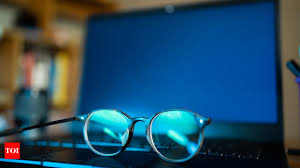How Blue Light Affects Your Eyes and What You Can Do About It
In this digitally evolved age, we are surrounded by screens everywhere, from smartphones to tablets and laptops to televisions. There’s no doubt that they are convenient sources, but the constant exposure to blue light that comes with them can cause discomfort to your eyes. Learn in this detailed guide what blue light is, its effects on the eyes and what steps can be taken to reduce exposure to blue light.
What is blue light?
Blue light is a high-energy visible (HEV) light with the shortest wavelength in the visible light spectrum, just above ultraviolet light. It occurs naturally as the sun is its biggest source. However, digital screens, such as televisions, smartphones, tablets and LED lighting, are artificial sources that expose you to blue light throughout the day and even at night.
How blue light affects your eyes
The following are some ways blue light can affect your eyes:
Digital eye strain – Spending prolonged hours staring at screens can lead to digital eye strain. Also known as computer vision syndrome (CVS), it is a condition that causes dry eyes, blurry vision, headaches behind the eyes, pain in the neck and shoulders, and sensitivity to bright light. Blue light contributes to the discomfort of the eyes by scattering into different directions more easily than other visible light, making it harder for the eyes to focus and causing visual fatigue.
Sleep disruption – Exposure to blue light in the evening or night can hinder the production of melatonin, the hormone responsible for regulating sleep. This disruption can make it harder to fall asleep, reducing the quality of sleep and affecting the body’s internal clock. Sleep disruption is particularly experienced by those who use smartphones or laptops late at night.
Potential long-term eye damage – Although research is still underway, some studies suggest that excessive exposure to blue light can increase the risk of age-related macular degeneration (AMD) over time. Furthermore, many experts believe that too much blue light can reach the retina, potentially causing damage to light-sensitive cells present there.
How to protect your eyes from blue light
The following are some useful tips to protect your eyes from blue light:
Wear blue light glasses – Specially designed to block blue light emitted from digital screens, blue light glasses can help reduce the harmful effects of blue light on the eyes. Also known as computer glasses, they are ideal for mitigating digital eye strain and can also improve sleep quality, especially when used in the evening or night.
Follow the 20-20-20 rule – Take a 20-second break every 20 minutes and look at something 20 feet away. This simple habit can give your eyes a much-needed break from screens now and then, reducing digital eye strain and helping your eyes relax during your busy day.
Enable night mode – Most devices, especially smartphones, these days come with a ‘night mode’ or ‘dark mode’ feature, which is effective in reducing eyes’ exposure to blue light rays during evening and night hours. These modes adjust your screen’s colour temperature to warmer tones, making it comfortable for the eyes and less likely to hinder sleep.
Maintain proper lighting – Make sure that your workplace is properly lit to reduce glare and avoid staring at overly bright screens in dark rooms. Also, adjust the brightness of your computer or laptop to comfortable contrast levels to refrain from straining your eyes.
While we can’t remove blue light altogether from our lives in this digital-first world, we can still deal effectively with it by wearing blue light glasses every time we use a digital screen. Feel Good Contacts is a renowned eyewear retailer that offers blue light glasses at affordable prices.

